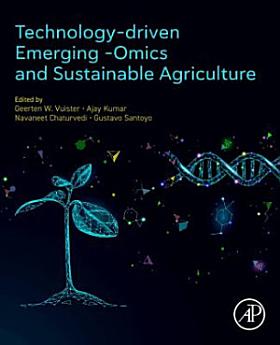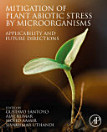Technology-driven Emerging -Omics and Sustainable Agriculture
About this ebook
About the author
Geerten W. Vuister holds a chair position in Structural Biology at the Institute for Structural and Chemical Biology of the University of Leicester and is an honorary professor at the University of Birmingham, associated with the UK National NMR facility. Professor Vuister also chairs the Collaborative Computational Project for NMR (CCPN), a long-standing, international, UKRI-funded project to support biomolecular NMR with software tools, training and establishing best-practices. His research focuses on biomolecular data analysis, including artificial intelligence and machine learning approaches, data remediation, and harvesting for omics type repositories and data exchange. As member of the world-wide PDB (wwPDB) validation task force and member of the working group on integrative structures, and as chair of the NMR-exchange working group, he is directly involved in efforts to leverage the information that can be obtained from integrated omics approaches. Professor Vuister has published over 130 peer-reviewed articles, including in Nature Struct. Mol. Bio., Nature Methods, Structure, J. Am. Chem. Soc., PNAS, Scientific Reports, Mol. Cell and Front. Mol. Biosci.
Dr. Ajay Kumar is currently working as an assistant professor at Amity Institute of Biotechnology, Amity University, Noida, India. Dr. Kumar recently completed his tenure as a visiting scientist from Agriculture Research Organization, Volcani Center, Israel. He has published more than 175 research, review articles, and book chapters in international and national journals. He serves as an associate editor for Frontiers in Microbiology and as guest editor for various journals such as Plants, Microorganisms, and Sustainability. Dr. Kumar has also edited more than 32 books with the leading publishers such as Elsevier, Springer, and Wiley. Dr. Kumar has wide area of research experience, especially in the field of plant-microbe Interactions, microbial biocontrol, Postharvest management of fruits, microbial endophytes related to medicinal plants and cyanobacteria-pesticides interactions.
Navaneet Chaturvedi is an assistant professor at the Amity Institute of Biotechnology, Amity University, Noida, India. He has established a robust foundation, acquiring essential skills that position him well for success in a research-intensive role within the institute. With 7.5 years of experience, Dr. Chaturvedi is enthusiastic about making substantial contributions to the esteemed research community. His research spans across various institutions globally, including Tel Aviv University (Israel), IIT(BHU) India, University of Information Science & Tech North Macedonia, University of Leicester (UK), and PharmCADD in South Korea. These diverse experiences have allowed him to collaborate with multidisciplinary teams, fostering a culture of innovation and excellence. His expertise encompasses molecular dynamics (MD) simulation, molecular docking, free energy calculation, machine learning, protein folding, and computer-aided drug design. Dr. Chaturvedi has authored approximately 25 scientific contributions, and this number continues to grow. These contributions take the form of research and review articles as well as book chapters, published with leading international journals and publishers.
Dr. Gustavo Santoyo obtained his Doctor of Science degree in Biomedical Sciences at the National Autonomous University of Mexico (UNAM) in 2005 and did postdoctoral studies during 2005-2007 at the Center for Cancer Research, NIH, USA, as well as a sabbatical year (2014-2015) at the Wilfrid Laurier University, Canada. He is currently a full-time research professor at the Institute of Chemical and Biological Research of the Universidad Michoacana de San Nicolás de Hidalgo, in Morelia, Mexico. His research interest is led towards plant-microbe interactions, biocontrol of fungal pathogens, development of bioinoculants for agricultural crops, and basic research on microbial diversity of extreme environments. In these research areas has published 80 scientific publications with more than 4000 citations and a h-factor 29. In the Academy, He has supervised more than 30 doctoral, master and undergrad thesis. Dr. Santoyo is a member of the Mexican Academy of Sciences and the National Research System (SNI) of the National Council of Science and Technology (CONACYT) in Mexico.






